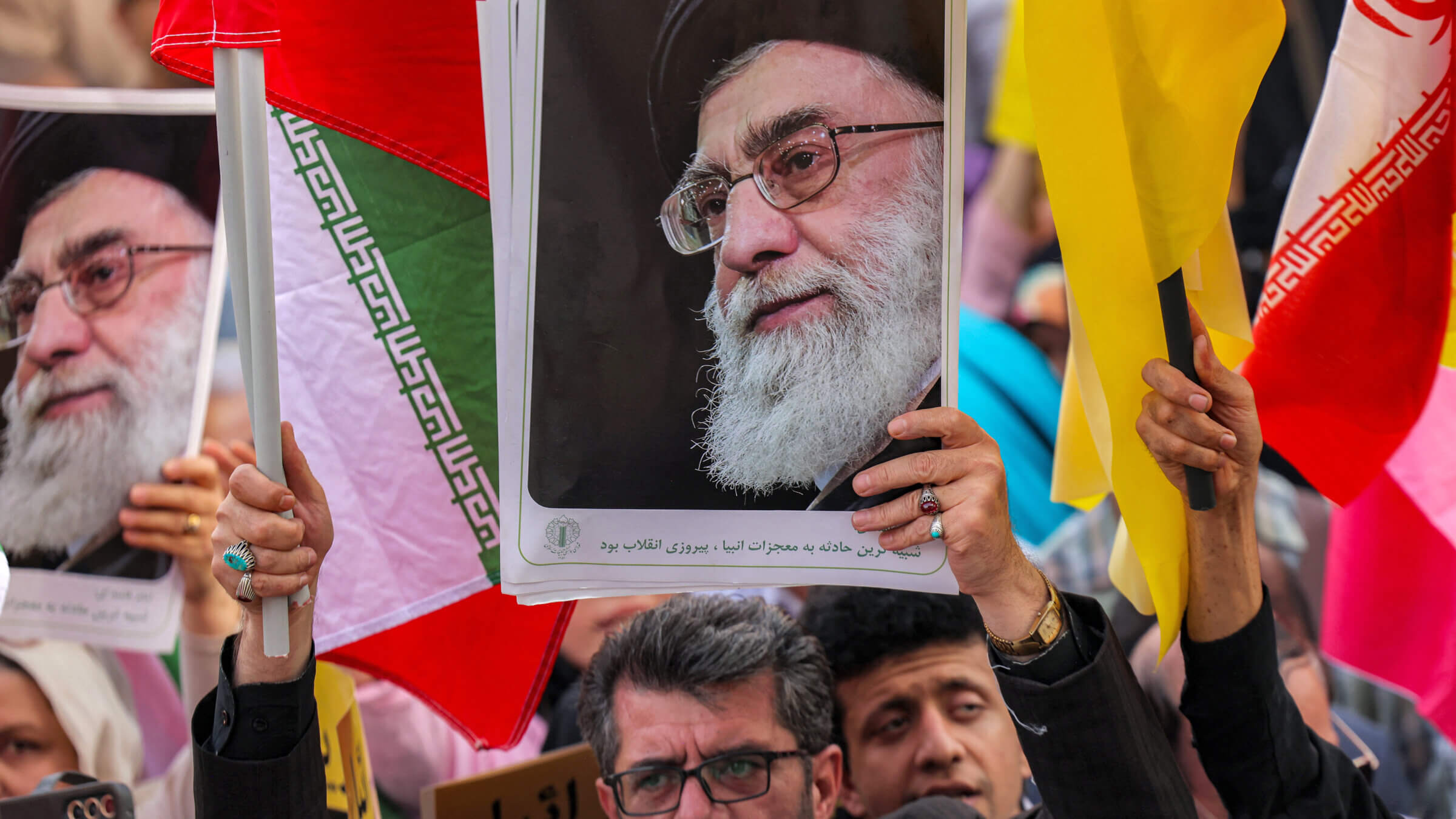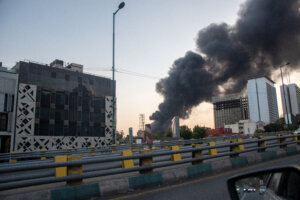When it comes to regime change in Iran, Jews should be careful what they wish for
While even in Tehran some have welcomed Israel’s attack, we need to consider what comes next

A demonstrator holds a picture of Iran’s Supreme Leader Ayatollah Ali Khamenei in Tehran. Photo by Getty Images
The first night of Israel’s attack on Iran, I texted one of my friends in Tehran, worried about his welfare, and learned that, as the bombs fell, his entire family was fearfully huddled together in one room, just like my Israeli friends and cousins. I was struck, therefore, by his response on the second night of Israel’s bombing.
“The mood is strangely good,” he texted me over our encrypted platform, “as if we already got used to it. Just a few minutes ago there was a big explosion near us, but everyone preferred to go back to sleep.”
When I expressed surprise, he explained, in his imperfect English: “I think people are deeply trusting Israel not to bomb residential areas. Even some say if a residential [area] is hit, it certainly is the Islamic Republic’s responsible.”
I told him about the extensive damage to residential areas I was seeing on TV news reports here in New York. “True!” he wrote. “But people’s reaction is even more satisfying. Surprisingly.”
The missiles, he said, were hitting mostly upper-class neighborhoods, where many of the country’s leadership lived. “People don’t consider them commoners,” he explained. He compared them, witheringly, to a Hamas leader “living in Qatar in a 5-star hotel.”
I don’t know how he feels now, with President Donald Trump’s call Monday on all of Tehran to evacuate. But this exchange didn’t totally surprise me. Months ago this friend told me that he and his pals actually hoped Israel would bomb their country. After the government’s bloody repression of so many protests — the Women, Life, Freedom marches in 2022; the Bloody Aban protests in 2019; the 2009 Green Movement marches against the regime’s massive election fraud — maybe only Israel could rid Iran of the brutal leaders these protests failed to, he said.

Later, a member of my minyan also wrote to ask my thoughts about the prospects of regime change if Israel pressed forward with its war and, in particular, if Trump brought in the United States. I was flattered that he thought my views had some special weight from my having lived in Iran very long ago and reported from there briefly for the Forward 10 years ago. I’m not sure he’s right. Nevertheless, I do have some views. And they are unlikely to please my friends in Iran, my minyan friend here in New York — or even me.
I believe history will judge a war of regime change — especially if Trump brings our country in — as an epic catastrophe whose magnitude will exceed George W. Bush’s invasion of Iraq by several orders.
I could be wrong, but…
Consider how we did under the leadership of the more stable, if poorly informed, Bush Jr. in Iraq — a country a quarter Iran’s size with half its population. Our joining a war in Iran would be based on incomplete information, as it was in Iraq — and, in this case, some information that is knowably false ahead of the time, rather than after-the-fact. Despite Trump’s claims, for example, U.S. intelligence assesses that Iran is not engaged in a nuclear weapons program and hasn’t been since 2003. Director of National Intelligence Tulsi Gabbard told the Senate Select Committee on Intelligence this in March, faithfully reporting the intelligence community’s consensus view — both pre-Trump and after.
Or consider Afghanistan, another, arguably more justified Bush intervention into a country less than half Iran’s size in both square miles and population. In 2021, after two decades of blood and treasure, we hightailed it ignominiously out of that country, in accordance with an agreement that Trump signed with the Taliban in his first administration, which his successor, Joe Biden, disastrously implemented.
I hope I am wrong about this; because if we do join in, a U.S. population that never sought this war and was not prepped for it in any way by its leaders (unlike with Bush) will view Israel as having sucked the U.S. into its own fight, with the associated costs in treasure and possibly blood.
Many Jews seem excited about the prospect of regime change. But if the regime in Iran does fall, there is no government in exile, like de Gaulle’s, waiting in the wings to rule, as the French general did after the Allies liberated France in World War II. A long and bloody civil war is a more likely outcome — a civil war in which Israel and the U.S. will both believe they have an interest; and not necessarily the same interest. Or maybe they will install a kind of unstable puppet regime over a churning and restless populace, unclear about its own direction.
As Tom Friedman noted before Bush invaded Iraq, one way or another the Pottery Barn rule comes into play: You break it, you own it. Given this, there are many, many things it would be good to know about Iran beforehand rather than learn after you break it, as we did in Afghanistan and Iraq. But Trump, the avowed enemy of expertise, has slashed his National Security Council to less than half the size it was when he arrived in January. Those gone include many experts on the Middle East and Iran.
For example, as Trump considers getting on board with Prime Minister Netanyahu’s reported eagerness to assassinate Iran’s Supreme Leader, the Grand Ayatollah Ali Khameini, it would be helpful to know that the Shiite religious culture of Iran reveres martyrdom in profound ways that go beyond those found in Sunni Islamic societies. The murder of this vicious, unpopular and reportedly ailing 86-year-old man would give him a theological and — more importantly for the invaders’ reception — political advantage that he could never otherwise hope to attain.
It would also give the Iranian Council of Experts, a large, well-organized committee of clerics, who are elected in a national vote, a chance to fulfill their mission of anointing Khameini’s successor. These council members, who are seen as experts in Islamic jurisprudence, are, like it or not, still respected in segments of Iran’s population. Khameini’s murder would offer them the opportunity to choose a younger, more vigorous successor. It would help Trump and his cohorts to even know that there is a Council of Experts charged with carrying out this task; and that their leading candidates may be even more hard-line than Khameini.
But Trump has no one in his immediate circle with experience in international crisis management, much less knowledge about Iran. He’s not actually getting any information. Just reacting, with his impulses about who and what looks “strong,” in response to ongoing developments and the varied pressures on him.
If Trump does join in with Israel’s attack, American Jews also should be aware that they will be associated with the consequences, however they turn out. The reasons will include unmistakable antisemitism, with its classical charges of dual loyalty; but also a Jewish state that itself claims to speak and act for all Jews and the political positioning of most of the organized American Jewish community in support of Israel’s attack. This week, the American Israel Public Affairs Committee, one of the most influential Capitol Hill lobbying groups and, through its political action committees, the largest pro-Israel group donating to politicians’ campaigns, urged lawmakers to fully back Israel against “our shared enemy, Iran.”
It’s a great shame that we are not now in the 10th year of the nuclear deal with Iran that President Obama negotiated in partnership with Great Britain, France, Germany, Russia, China and the European Union. Trump threw that one out when he came into office. Iran nevertheless continued to abide by it initially — until it, too, eventually disavowed the pact’s terms. Those strongly enforceable terms presented Israel with genuine non-nuclear strategic challenges, but many of Israel’s own security experts advised that it was worth supporting in consideration of the alternatives. Netanyahu, prime minister then, as now, dismissed this counsel. Yet under its provisions, Iran was barred from developing highly enriched uranium. It was limited, in fact, to 3.67% enrichment, compared to the 60% it has attained since Netanyahu urged Trump to reject the agreement in his first term.
As for the related but separate issue of regime change, it is even sadder that Israel finds no cost too high to pay to avoid doing the one thing that would destroy the Iranian mullahs’ standing and legitimacy most effectively — getting its settlers out of the West Bank and starting talks on a Palestinian state. Compared to this war, that would save Israel a lot of money, too. But that’s another story.
My friend in Tehran, meantime, has not written back since Tuesday.
















